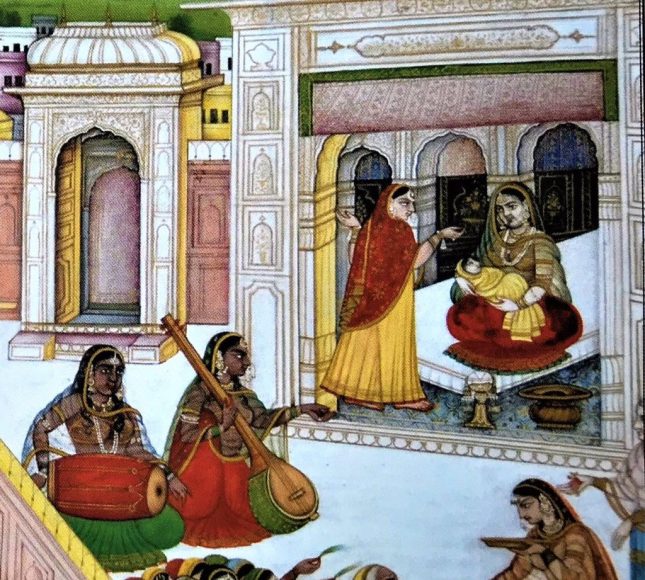BISHAN KAUR, mother of Mata Gujari and wife of Lal Chand, was a woman gifted with good looks and fortune. Both husband and wife were the devoted Sikhs of Guru Hargobind. They were among the guests assembled to witness the nuptial ceremonies of Suraj Mall, son of Guru Hargobind. It was there that she, as says Gurbilas Patshahi Chhevin, had had a glimpse of young Tegh Bahadur who later occupied the holy office as the ninth Guru of the Sikhs.
She felt charmed by the handsome face of the young man and was doubly pleased to learn that he was still un-affianced. She saw him as the prospective groom for her seven year old daughter, Gujari. She and her husband went to Guru Hargobind who willingly accepted the proposal. The marriage of Mata Gujari and Guru Tegh Bahadur was solemnized on 9 Phagun 1689 Bk/4 February 1633.
References :
1. Gurbilas Patshahi Chhevin. Patiala, 1970
2. Trilochan Singh, Guru Tegh Bahadur. Delhi, 1967
3. Harbans Singh, Guru Tegh Bahadur. Delhi, 1982
Bishan Kaur: Mother of Mata Gujari & Her Legacy, shedding light on her role in nurturing a lineage that would come to shape the very soul of Sikh tradition.
Genealogical Roots and Family Background
Bishan Kaur is remembered in Sikh historical narratives as the mother of Mata Gujari (formally known as Mata Gujar Kaur), who was born in 1624 in Kartarpur in the present-day Kapurthala district. According to traditional accounts such as those compiled in Sikh encyclopedic sources, Bishan Kaur, along with her husband Bhai Lal Chand Subulikka, belonged to a pious family whose values and spiritual discipline set the stage for a remarkable legacy.
This household not only instilled deep-rooted Sikh values in their children but also reflected the regional traditions of Punjab. The nurturing environment created by Bishan Kaur enabled her daughter, Mata Gujari, to grow up with an innate sense of devotion, compassion, and resilience—qualities that would become instrumental in the evolution of the Sikh guruship.
Piety and Cultural Context
In an era when the transmission of spiritual teachings often relied on oral traditions and familial guidance, Bishan Kaur’s household became a cradle for the consistent practice of Sikh values. Though historical records rarely delve into minute biographical details of women like Bishan Kaur, her influence is discernible through the exemplary character of Mata Gujari.
The cultural landscape of 17th-century Punjab was one of rich intermingling of indigenous traditions and the freshly emerging Sikh ethos. In this vibrant milieu, Bishan Kaur’s commitment to piety—marked by simplicity, devotion, and ethical living—helped lay the groundwork for the transformative spiritual experiences that would later define the Sikh community.
Legacy Through Influential Daughter
Bishan Kaur’s enduring legacy is most profoundly reflected in the life of her daughter, Mata Gujari.
- Spiritual Transmission:
Mata Gujari went on to become a pivotal figure in Sikh history. As the wife of Guru Tegh Bahadur (the ninth Guru) and the mother of Guru Gobind Singh (the tenth and final human Sikh Guru), she was uniquely positioned to influence not just her immediate household but an entire community. The values, compassion, and spiritual fortitude that she exhibited as a matriarch had their roots in the nurturing provided by Bishan Kaur. - Continuity of Guruship:
The contribution of Bishan Kaur’s lineage is interwoven with the evolution of Sikh guruship. By ensuring that her daughter was raised in an environment that honored devotion and ethical living, Bishan Kaur helped secure a legacy that would reinforce the spiritual credentials of the Sikh Gurus. Through her guidance—passed on via Mata Gujari—an enduring chain of tradition and leadership was established, which resonates in the teachings and practices of modern Sikhism. Influence on Sikh Women’s Role and Cultural Memory
Bishan Kaur’s legacy extends beyond her immediate familial connection; it serves as an inspirational touchstone for Sikh women throughout history.
- Empowerment and Nurturance:
The example of Bishan Kaur underscores the pivotal role women have played in fostering spiritual continuity and social stability. Although her name may be less prominent in historical records than that of her illustrious descendants, her quiet strength and dedication enabled the nurturing of a cultural and religious heritage that remains vibrant today. - Cultural Reverence:
Today, the story of Bishan Kaur and her nurturing of Mata Gujari is celebrated in Sikh literature and oral tradition. It reminds the community that behind every great leader lies a legacy of behind-the-scenes dedication—a reminder that the values of love, service, and steadfast faith are at the heart of Sikh identity.



